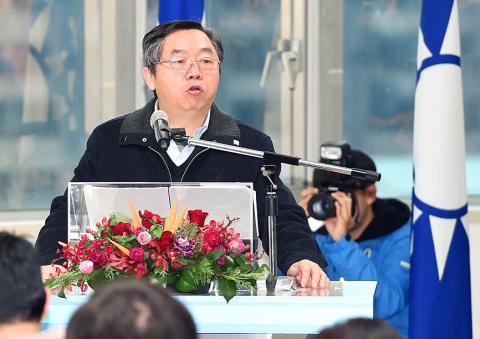The Chinese Nationalist Party (KMT) yesterday said it is considering collecting a “special party fee” and raising the contribution amounts required by KMT cadres and public office holders, in a last-ditch effort to remedy what the party called an “unprecedented financial crisis.”
“The challenge facing the KMT is unprecedented, as is its current financial crisis. To make matters worse, the passage of the Political Party Act (政黨法) last month significantly restricted the engagement of political parties in profit-making activities,” KMT Administration and Management Committee director Chiu Da-chan (邱大展) said in his report on the party’s financial situation at a meeting of the KMT Central Committee in Taipei yesterday.
It was the first meeting of the 210 members of the Central Committee since they were elected in September.

Photo: Liao Chen-huei, Taipei Times
To keep from being dependent on borrowed money, the party plans to levy a “special party fee” on party members and require KMT cadres and public officials to contribute more to the party, Chiu said.
“We are still discussing what a reasonable amount would be for local office holders to contribute and we will let everyone know once we decide,” Chiu said.
In November last year, then-KMT chairwoman Hung Hsiu-chu (洪秀柱) passed a regulation that stipulated the amount that each high-level party member would need to raise annually. The regulation was an attempt to alleviate the party’s financial straits amid ongoing efforts by the Ill-gotten Party Assets Settlement Committee to recover party assets allegedly acquired illegally during the nation’s authoritarian era.
The regulation requires the KMT chairperson and vice chairs to each raise NT$10 million, while special municipality mayors must raise NT$2 million and party lawmakers NT$500,000.
According to Chiu, KMT Chairman Wu Den-yih (吳敦義) has borrowed NT$140 million since he assumed the chairmanship to pay the party’s monthly administrative and personnel expenditures, which total NT$30 million.
“There are hidden liabilities,” Chiu said, citing the party’s downsizing plan in January, which includes 719 laid-off staff receiving a total of NT$970 million in severance pay and pensions, and pension payments to retired staff, an amount to be decided in an ongoing negotiation.
Meanwhile, the KMT has only NT$10.1 million in disposable cash in its bank accounts, Chiu said, as NT$10.5 million of the party’s savings have been frozen.
The Chang Yung-fa Foundation has also yet to pay NT$100 million owed to the party for the company’s acquisition of the former KMT headquarters in Taipei’s Zhongzheng District (中正) in 2006, Chiu added.
Despite allegations that the party possesses overseas assets worth hundreds of billions of New Taiwan dollars, the KMT only owns real estate with a combined worth of NT$2 billion, including land measuring 33,000m2 and buildings with more than 50,000m2 in floor space, Chiu said.
“Although Central Investment Co (中投資產) is owned by the KMT and has NT$34.8 billion in assets, its net worth, after excluding liabilities, is only NT$15.3 billion — and that money has all been frozen,” he said.
The Ill-gotten Party Assets Settlement Committee in November last year ruled that Central Investment Co was a KMT-affiliated organization and prohibited it from disposing of its assets.

The brilliant blue waters, thick foliage and bucolic atmosphere on this seemingly idyllic archipelago deep in the Pacific Ocean belie the key role it now plays in a titanic geopolitical struggle. Palau is again on the front line as China, and the US and its allies prepare their forces in an intensifying contest for control over the Asia-Pacific region. The democratic nation of just 17,000 people hosts US-controlled airstrips and soon-to-be-completed radar installations that the US military describes as “critical” to monitoring vast swathes of water and airspace. It is also a key piece of the second island chain, a string of

A magnitude 5.9 earthquake that struck about 33km off the coast of Hualien City was the "main shock" in a series of quakes in the area, with aftershocks expected over the next three days, the Central Weather Administration (CWA) said yesterday. Prior to the magnitude 5.9 quake shaking most of Taiwan at 6:53pm yesterday, six other earthquakes stronger than a magnitude of 4, starting with a magnitude 5.5 quake at 6:09pm, occurred in the area. CWA Seismological Center Director Wu Chien-fu (吳健富) confirmed that the quakes were all part of the same series and that the magnitude 5.5 temblor was

Taiwan will now have four additional national holidays after the Legislative Yuan passed an amendment today, which also made Labor Day a national holiday for all sectors. The Chinese Nationalist Party (KMT) and Taiwan People’s Party (TPP) used their majority in the Legislative Yuan to pass the amendment to the Act on Implementing Memorial Days and State Holidays (紀念日及節日實施辦法), which the parties jointly proposed, in its third and final reading today. The legislature passed the bill to amend the act, which is currently enforced administratively, raising it to the legal level. The new legislation recognizes Confucius’ birthday on Sept. 28, the

The Central Weather Administration has issued a heat alert for southeastern Taiwan, warning of temperatures as high as 36°C today, while alerting some coastal areas of strong winds later in the day. Kaohsiung’s Neimen District (內門) and Pingtung County’s Neipu Township (內埔) are under an orange heat alert, which warns of temperatures as high as 36°C for three consecutive days, the CWA said, citing southwest winds. The heat would also extend to Tainan’s Nansi (楠西) and Yujing (玉井) districts, as well as Pingtung’s Gaoshu (高樹), Yanpu (鹽埔) and Majia (瑪家) townships, it said, forecasting highs of up to 36°C in those areas